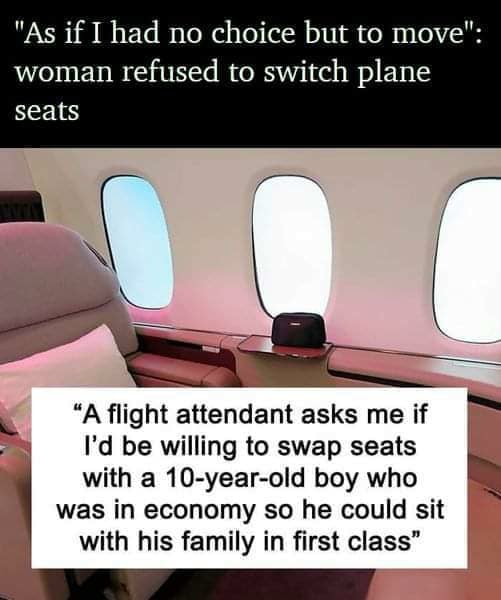Air travel is often stressful, especially when you’re looking forward to a long-anticipated trip. But what happens when you’re asked to give up a hard-earned upgrade? A recent incident has sparked an online debate, bringing this very question to the forefront.
A 23-year-old woman recently shared her experience of being asked to swap her first-class seat with a 10-year-old boy seated in economy class so that the child could sit with his family. She had spent more than a year planning a dream trip to San Francisco, and just before her departure, the airline offered her a free upgrade to first class due to her frequent flyer status. Naturally, she was thrilled. It was her first time flying first class on a 13-hour flight, and the promise of added comfort made her excitement skyrocket.
However, things took a turn when about an hour into the flight, a flight attendant approached her with a peculiar request. She was asked if she would be willing to switch seats with the boy, who was seated in economy, so he could join his parents in first class. Apparently, the parents, who were also frequent flyers, had received upgrades but did not realize their son wasn’t eligible for one.
The flight attendant, who remained polite throughout the interaction, presented several options to the young woman. She could either receive a full refund for her ticket or get another upgrade on a future flight. The request was phrased in a way that made the woman feel like she had no choice but to move. “I honestly felt like I was getting kicked out,” she recalled.
Despite the pressure, she decided to keep her seat. After all, the upgrade was based on her own loyalty points, and she had been looking forward to the experience for a long time. She even mentioned that she would have considered giving up her seat had the parents paid for their tickets, but they hadn’t, which further cemented her decision.
As the flight progressed, she was subjected to judgment from a nearby passenger—an elderly woman who scolded her for “making a child sit alone for 13 hours.” The young woman, however, pointed out that the child was free to walk up and down the aisles and visit his parents whenever he wanted, which he did frequently throughout the flight.
Once she shared her story on social media, a flurry of comments ensued. Opinions were divided: some people criticized her for lacking empathy for the child, while others supported her stance, arguing that she had every right to enjoy the upgrade she earned. Many commenters also pointed out that airlines should improve their policies for family seating, especially when upgrades are involved. After all, the blame shouldn’t be on individual passengers but rather on the system that allowed such an awkward situation to arise in the first place.
Flying first class is often viewed as a luxury that comes with perks like extra legroom, better service, and a quieter atmosphere. However, it’s also a space where emotions can run high, as other passengers might feel entitled to certain concessions. In this case, many believed that the airline should have sorted out the issue without putting the responsibility on the woman to make the switch.
This incident has highlighted a broader problem in the airline industry: the tendency to prioritize profit over passenger comfort. Overbooking and mismatches in seating arrangements can lead to uncomfortable and sometimes confrontational situations. Some passengers, particularly families, can find themselves in frustrating predicaments where they’re separated due to the complexities of airline upgrades and seating charts.
Looking at the bigger picture, this story has resonated with many because it touches on a common dilemma: should you prioritize your own comfort, especially when you’ve earned it, or should you sacrifice for someone else’s benefit, particularly a child’s? The young woman was clear that her decision was not rooted in spite, but rather in a desire to enjoy the upgrade she had looked forward to for over a year. The fact that the airline didn’t properly manage the family’s seating arrangements wasn’t her fault, and many commenters echoed this sentiment.
As airlines continue to grapple with customer satisfaction in an age where travel is both a privilege and a hassle, incidents like these serve as a reminder of the complexities of flying. While some believe in offering a helping hand in such situations, others firmly believe that passengers shouldn’t be made to feel guilty for enjoying the perks they’ve earned.

